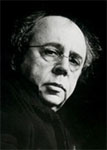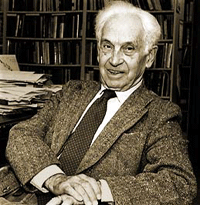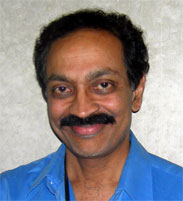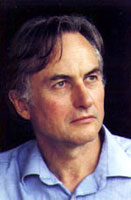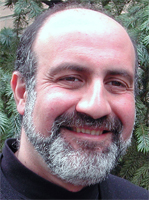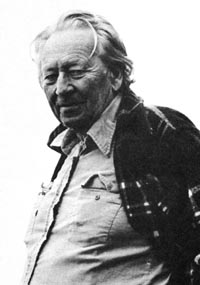
Introduction
November 20, 2004 — In 1974, in honor of my friend Gregory Bateson's 70th birthday, I asked him if he would give his blessing to a book I was planning about his work. He agreed, and the result was About Bateson, a volume of original essays about his work and ideas by interesting thinkers in various fields bracketed by my Introduction and his Afterword, both of which follow below.
Gregory Bateson was one of the most important and least understood thinkers of the twentieth century. Bateson originated the double bind theory of schizophrenia, was the first to apply cybernetic theory to the social sciences, and made important biological discoveries about such nonhuman species as the dolphin. His book, Steps To An Ecology of Mind, published in 1972, attracted widespread attention. We met in April, 1973 at the AUM Conference ("American University of Masters") at Esalen in Big Sur, where we immediately became friends, and where he convinced me to become an agent. Within a month I had founded Brockman, Inc. and sold his book The Evolutionary Idea (ultimately published under the title Mind In Nature).
While Gregory was very much alive, with his blessing and mentoring, I conceived of, and edited, a book entitled About Bateson, a book which featured seven substantial essays by eminent thinkers in their own right-containing their own interpretations of and reactions to Bateson's work.
In the 250-page volume, Mary Catherine Bateson discussed her father's treatment of the concept of wisdom and love-the "lucid" computations of the heart"; Ray Birswhistell analyzed Bateson's unique methodology; David Lipset provided a short biography of the thinker's wary years; Rollo May discussed Bateson's humanism; Margaret Mead explored his effect on cross-cultural analysis (Groegory her 2nd husband); Edwin Schlossberg contributed a piece on consciousness, social change, and cybernetics. As editor, I wrote the introductory essay. The book concluded with Gregory Bateson's own original 12-page Afterword, in which he presented his latest thinking on his life's work. Also included was a 2-page CV and a Bibliography page of his book.
At that time, Bateson contended that as a result of advances in cybernetics and fundamental mathematics, many other areas of thought have shifted. In The Evolutionary Idea, a proposed new book, he planned to gather together those new advances to present an alternative to then current orthodox theories of evolution. This alternative view was to stress the role of information, that is, of mind, in all levels of biology from genetics to ecology and from human culture to the pathology of schizophrenia. In place of natural selection of organisms, Bateson considered the survival of patterns, ideas, and forms of interaction,
"Any descriptive proposition," he said, "which remains true longer will out-survive other propositions which do not survive so long. This switch from the survival of the creatures to the survival of ideas which are immanent in the creatures (in their anatomical forms and in their interrelationships) gives a totally new slant to evolutionary ethics and philosophy. Adaptation, purpose, homology, somatic change, and mutation all take on new meaning with this shift in theory."
Bateson had an endless repertoire of concepts and ideas to talk about. A typical conversation might be about metaphor versus sacrament, schismogenesis, metaphysics, explanatory principles, heuristic versus fundamental ideas, the value of deduction, steady state society, metapropositions, deuterolearning, cybernetic explanation, idea as difference, logical categories of learning, mental determinism, end linkage, and on and on.
While his ideas did take hold in some fields (schizophrenia, family therapy, among others), the natural audience for his work, the evolutionary biologists, had little interest in him. The mainstream thinkers in that field believed his ideas were muddled. This is one of several reasons why he ultimately abandoned the The Evolutionary Idea, which was to have been the first major restatement of evolutionary theory in half a century. Based on his previous experience, he was worried about the difficulty of getting across his ideas. The implications of the theory are based on acceptance of a radical new order of things, a worldview totally alien to our traditional Western way of thinking.
Aspects of this worldview derived from his association in the 1940s with Warren McCulloch, John von Neumann, Claude Shannon, and Norbert Wiener et al, who were all present at the creation of cybernetic theory. It was the radical epistemology behind these ideas seemed to inform a lot of this thinking. "The cybernetic idea is the most important idea since Jesus Christ.," he once told me.
And this is where we connected, as my book, By The Late John Brockman, which was very much on the radar screen at that time, was nothing if not a radical epistemological statement on language, thought, and reality. I had written the trilogy that ultimately comprised the book with no reference to Bateson as I had not read him and had barely heard of him until I was invited to the AUM conference in 1973 (my late invitation was sent when the organizers, John Lilly and Alan Watts, both strong supporters of my book, found out their keynote speaker, Richard Feynman, was ill, and they needed a replacement. Only when I arrived at the conference did I find out what I was walking into.)
"Evolutionists are an anxious, conservative, and spiteful bunch," Bateson said. "In fact, they kill each other." Bateson was referring to the famous affair involving his father, William Bateson, the preeminent British scientist of his day who, picking up on the work of Mendel, coined the word "genetics" and began the field, and William Kammerer, the Austrian biologist. Kammerer, a Lamarckian, committed suicide over research involving the inherited characteristics of the midwife toad. "I don't think they will like this book very much," Bateson said, realizing that he will be straying far from the traditional debate of natural selection versus inherited characteristics. "I shall not write the book. I am too old and too sick to fight the fight".
But he was always willing to travel, to interact with all kinds of people in order to present his ideas. This would lead him into strange surroundings, where the participants had no idea of what to expect and were not prepared for his depth and erudition. "Why do you bother?" I ask in reference to this particularly moribund gathering. It is clear that few here have any inkling of what he is saying. "One simply keeps going," he says gently, "and leaves the name behind." It wasn't easy making a living as an epistemologist, he noted.
Yet, he did receive recognition. Charles Roycroft, British psychoanalyst, was quoted in the Seventy-Fifth Anniversary Issue of the Times Literary Supplement as saying that Gregory Bateson was the most underrated writer of the past seventy-five years.
Bateson is not easy. The only way to "get" Bateson is to read him. To spend time with him, in person or through his essays, was a rigorous intelligent exercise, an immense relief from the trivial forms that command respect in contemporary society
—JB



